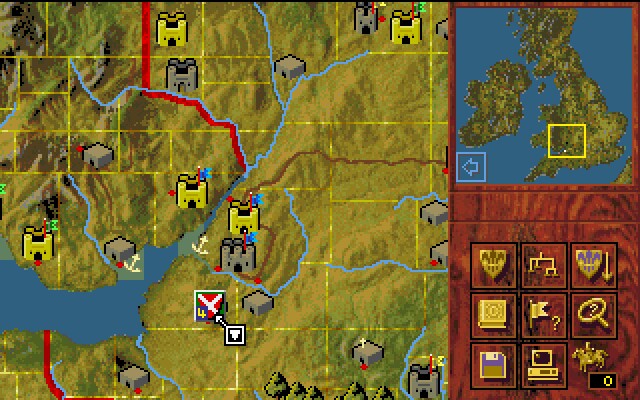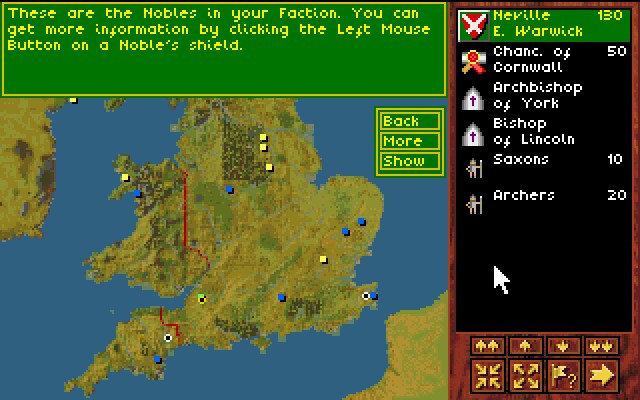Kingmaker1-Click Install
|
The Game
Avalon Hill's Kingmaker simulates the War of the Roses. No, not the movie starring Michael Douglas and Kathleen Turner, you dolt! The REAL THING! The 15th century battle between the Lancastrians (red roses) and the Yorkists (white roses) for the English crown. The computer game, programmed primarily by Graham Lilley, is based on Andrew McNeil's board game of the same name,
Players represent the mastermind behind a faction of ever-changing British noblemen. The point of the game is to have your faction secure a royal heir, get him (or her) crowned King (Queen Regent), and then keep him (her) alive whilst you exterminate all the other royal pretenders.
For those gamers who insist on a program that taxes their computer system as well as their minds, Kingmaker will be a disappointment. The program does not support SVGA even though it's copyrighted 1994. And the sound, if you don't have a SoundBlaster, is down-right ANNOYING! Take my word for it, if you don't have a sound card, just turn Sound Off. This games taught me the meaning of the phrase: "Silence is golden."
Advanced battle, on the other hand, does impact the game. Basical-ly, it allows the player him/herself to run the battle directly. Unlike advanced battle in the board game, the program allows the player to control combatants almost individually; directing the archers separate from the spearmen or the mounted nobles and royals. They've even added the occasional tree to the landscape to affect one's tactics. Otherwise, the computer determines victory or indecision based on the odds. No, I didn't leave out defeat accidentally; it's not an option. The larger force either wins the conflict or no one does. Underdogs "win" when a powerful noble in the stronger force dies in combat. Deaths-in-combat happen by chance to both attacker and defender when the computer determines results. A good tactician can *make* them happen manually. However, I personally find the advanced battle option unnecessarily confusing and avoid it. Even the manual states that it will rarely change the outcome. But it is probably like combat in the 15th century really was; lots of guys running around hacking blindly at anything in range.
Kingmaker turns (board and computer) are played in 6 phases: Events, Movement, Combat, Parliament, Corona-tion, and Reinforcement.
Events include plague, recalls of mercenaries, embassies, peasant revolts, foreign raids and piracy to name a few. Their effect is to call nobles/crowned royals/bishops to other tasks around England (usually anyplace but where you need them to be). The good thing is that the programmers have completely randomized this process, so unlike the predictable card deck on the board (once plague in York shows up, everyone knows York is effectively a safe haven until reshuffling) player must always be on guard. The bad thing is the random number generator is weak so the same events tend to recur 2 or 3 times in quick succession. Gets old quick, especially when the same noble keeps getting recalled away from a crucial force. Moreover, the game doesn't exempt nobles who aren't on the main island. Nobles who are in Ireland, on the Continent, at Calais or on any of the Isles of Man, Wight, or Anglesey need not respond to summons. That made them wonderful refuges on the board; not here.
Forces may move up to 5 spaces in good weather, 3 during storms. one thing that's easier now than on the board is the cursor plainly identifies locations that are in range and those that are not. Since the spaces on the board or screen can be inscrutable, this makes navigation easy. Just remember to count the 2 or 3 spaces around London or Conway where certain titles convey extra troops! Unlike the board game ships always move AFTER land forces but the game doesn't monitor the max capacity of ships (usually 100 troops). I've moved forces as large as 300+ on a single ship.
Combat ensues and, as I've stated, normal combat is sufficient. Computer players often seem to attack anything that moves (the AI bases a faction's actions on historical profiles of the game's dominant nobles). Be careful, though, the garrisons don't always match what they're supposed to be (Carlisle should have 200 men, not 100; and the open towns DO have garrisons). And the game considers combat in an open town to be a siege, not normal combat as it should (there are no walls behind which to hide!). This is bad because sieges are always successful is the weather holds.
Calling Parliament is the privilege of the sole King (see Coronation below) or the Chancellor of England. But I have never seen a computer faction call Parliament nor the Chancellor. It's a chance to reallocate titles and offices whose previous holders died. The problem is that there are usually more titles and offices than you can allocate within your faction so you'd have to help the opposition. The board game's way around this was to tally votes in the Houses of Lords and Commons (goodies had to pass in both Houses). This way a strong faction could call Parliament and minimize damages. It also allowed Parliament to confer Sole King status on one of two rival Kings. But the computer has no voting and no Event card to force a session of Parliament.
Because this is civil war, England may have 0, 1 or 2 Kings at any time. To hold a coronation, all you need is the ranking royal of either house and two bishops (or one archbishop) in a cathedral together. The game crowns the royal automatically (players could decide on the board), so if you don't want your royal crowned just yet, stay out of cathedrals.
Reinforcements are mercenaries, new offices, new titles and new nobles which you can play. The manual claims one can allocate these immediately or later, but since receipt of reinforcements signals the end of one's turn, it is invariably at least 1 full turn later and those mercenaries could save your hide between now and then!
If historical games interest you, then you'll enjoy Kingmaker. If, like me, your days of getting a half-dozen friends together for wars and munchies on the dining room table or in the basement are long past, then this is a welcome blast from the past. Enjoy.






